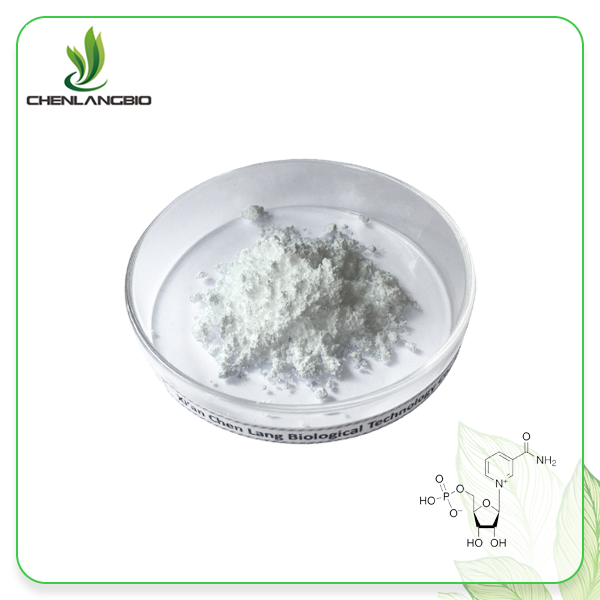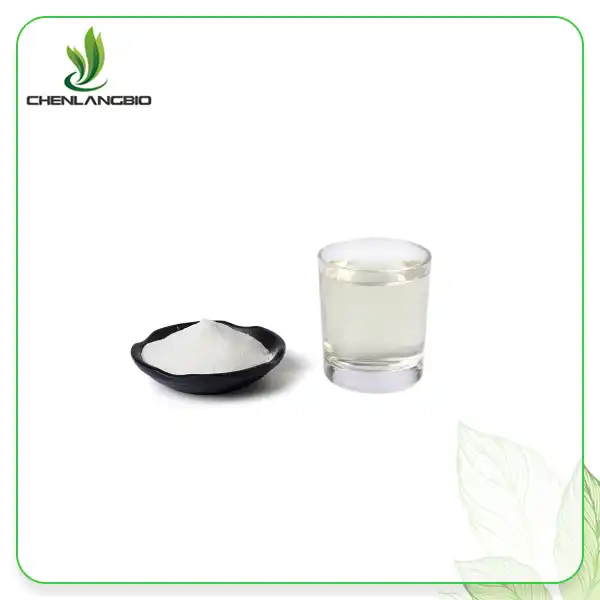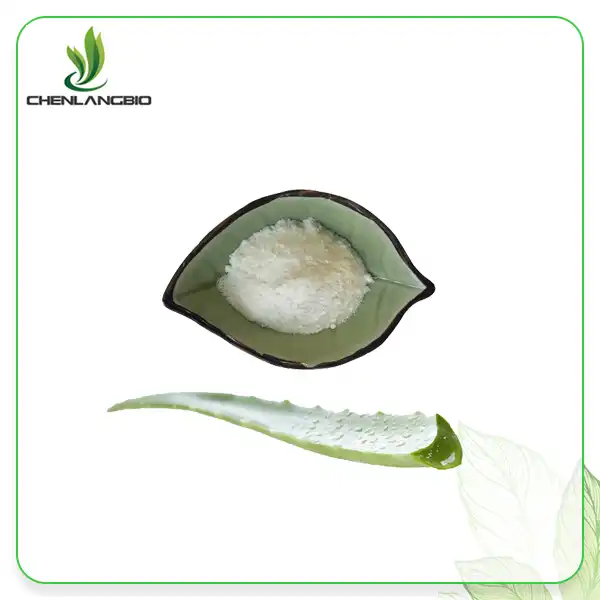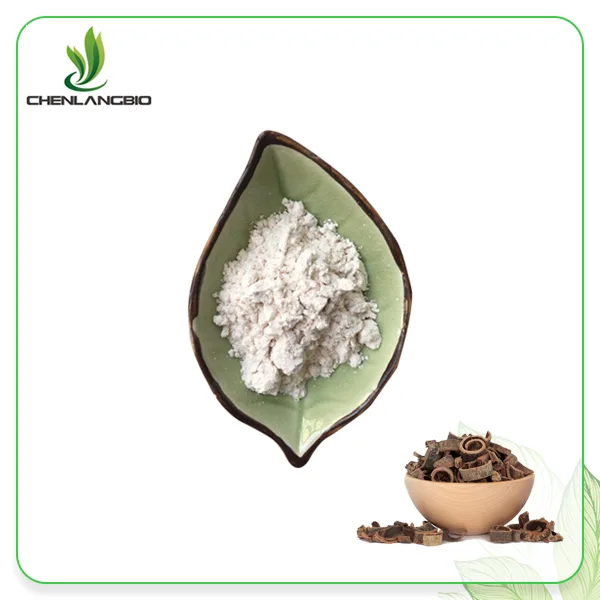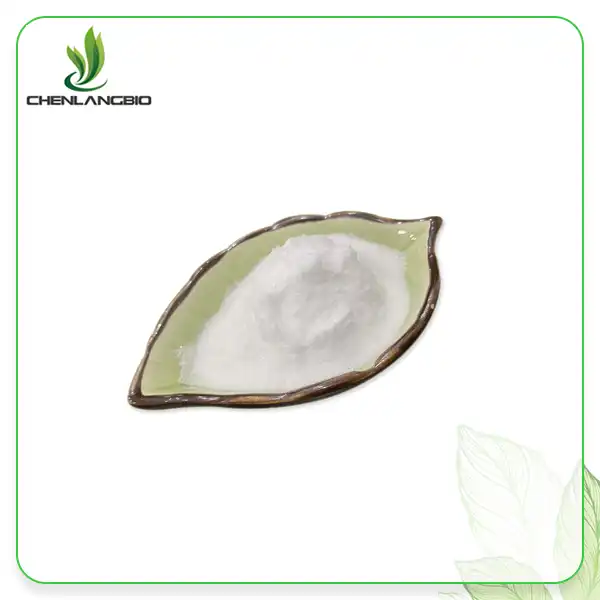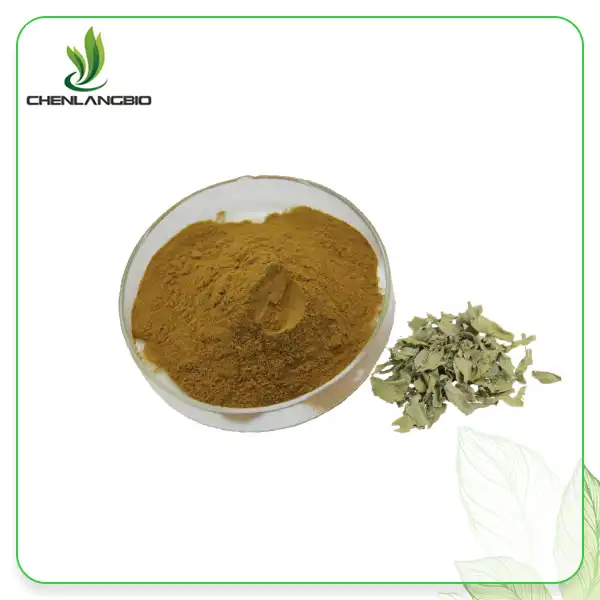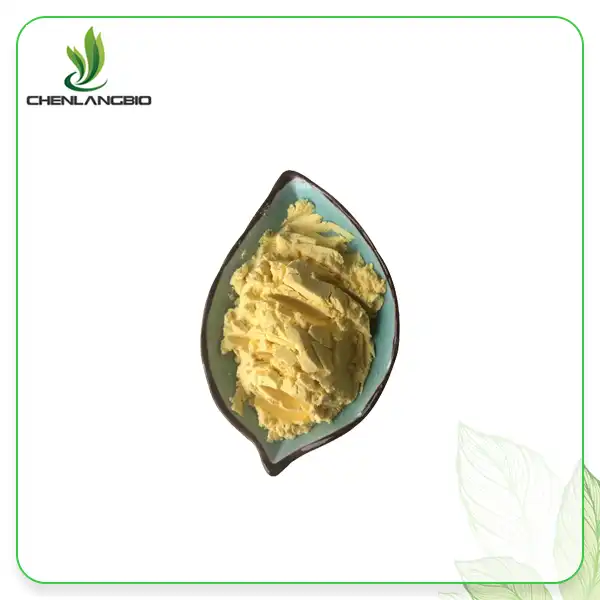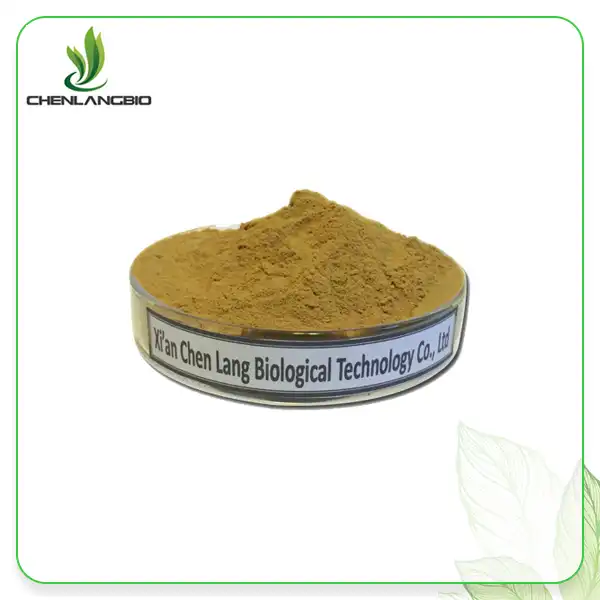How Does Dihydromyricetin Work?
2025-09-22 16:47:41
Are you searching for natural solutions to protect your liver from alcohol damage, reduce inflammation, or combat oxidative stress? Understanding how dihydromyricetin works could be the key to unlocking powerful health benefits you've been seeking. Dihydromyricetin powder, also known as DHM, operates through multiple sophisticated mechanisms that target cellular processes, metabolic pathways, and protective responses throughout your body. This comprehensive guide reveals the fascinating science behind this remarkable flavonoid compound and demonstrates why it's becoming increasingly recognized as one of nature's most versatile therapeutic agents.
The Molecular Mechanisms of Dihydromyricetin Powder Action
Dihydromyricetin, DHM functions through intricate molecular pathways that demonstrate remarkable specificity and efficacy. At the cellular level, DHM exerts its effects by modulating key signaling cascades that regulate inflammation, oxidative stress, and metabolic processes. The compound's unique chemical structure allows it to interact with multiple cellular targets simultaneously, creating a synergistic effect that amplifies its therapeutic potential. The primary mechanism involves the activation of nuclear factor erythroid 2-related factor 2 (Nrf2), a master regulator of antioxidant defense systems. When dihydromyricetin binds to specific cellular receptors, it triggers a cascade of events that upregulates the production of endogenous antioxidant enzymes, including superoxide dismutase, catalase, and glutathione peroxidase. This enhanced antioxidant capacity provides robust protection against free radical damage and oxidative stress-induced cellular dysfunction.
-
Cellular Signaling Pathways Influenced by DHM
Dihydromyricetin modulates several critical signaling pathways, including MAPK (mitogen-activated protein kinase), PI3K/AKT (phosphatidylinositol-3-kinase), and mTOR (mechanistic target of rapamycin) pathways. These pathways are fundamental to cellular survival, proliferation, and metabolic regulation. Through these mechanisms, Dihydromyricetin Powder demonstrates its ability to influence glucose metabolism, lipid homeostasis, and inflammatory responses. The compound also affects the NF-κB (nuclear factor kappa-B) pathway, which is central to inflammatory processes. By inhibiting NF-κB activation, DHM reduces the production of pro-inflammatory cytokines such as tumor necrosis factor-alpha (TNF-α), interleukin-1β (IL-1β), and interleukin-6 (IL-6). This anti-inflammatory action contributes significantly to its protective effects against various disease conditions.
Hepatoprotective Mechanisms of Dihydromyricetin
The liver-protective properties of dihydromyricetin represent one of its most studied and clinically significant mechanisms. DHM protects the liver through changes in lipid metabolism and enhanced ethanol metabolism, making it particularly valuable for individuals concerned about alcohol-related liver damage. The compound accelerates the breakdown of acetaldehyde, the toxic metabolite of ethanol, converting it into harmless substances that can be easily eliminated from the body. Dihydromyricetin Powder demonstrates remarkable efficacy in reducing liver enzyme elevations, particularly alanine aminotransferase (ALT) and aspartate aminotransferase (AST), which are key indicators of liver cell damage. The compound also helps normalize serum bilirubin levels and exhibits potent anti-fibrotic properties by inhibiting the activation of hepatic stellate cells and reducing collagen deposition in liver tissue.
-
Alcohol Metabolism Enhancement
Dihydromyricetin, DHM activates a cascade of mechanisms that accelerate alcohol elimination from the body, primarily by enhancing the activity of alcohol dehydrogenase (ADH) and aldehyde dehydrogenase (ALDH) enzymes. This enhanced enzymatic activity results in faster alcohol clearance and reduced accumulation of toxic metabolites. The compound also improves mitochondrial function in liver cells, supporting the energy-demanding processes involved in detoxification and metabolic recovery. Furthermore, dihydromyricetin modulates lipid metabolism by activating AMP-activated protein kinase (AMPK), a key regulator of cellular energy homeostasis. This activation promotes fatty acid oxidation while inhibiting lipogenesis, helping prevent alcohol-induced fatty liver disease and supporting overall hepatic health.
Anti-Inflammatory and Immunomodulatory Effects
Inflammation plays a crucial role in various diseases, and DHM possesses significant anti-inflammatory properties through multiple mechanisms. The compound inhibits the NLRP3 inflammasome, a protein complex responsible for the maturation and release of inflammatory cytokines. This inhibition helps control excessive inflammatory responses that can lead to tissue damage and chronic disease conditions. Dihydromyricetin Powder also modulates T-cell function and macrophage activation, contributing to balanced immune responses. The compound promotes the differentiation of regulatory T-cells while suppressing the activation of pro-inflammatory M1 macrophages. This immunomodulatory effect helps maintain immune homeostasis and prevents autoimmune reactions that can contribute to chronic inflammatory conditions.
-
Oxidative Stress Reduction Mechanisms
The antioxidant properties of DHM extend beyond simple free radical scavenging. The compound upregulates endogenous antioxidant systems while simultaneously reducing the production of reactive oxygen species (ROS) at the cellular level. Dihydromyricetin enhances the activity of glutathione-S-transferase, a crucial enzyme in phase II detoxification processes, thereby improving the body's ability to neutralize and eliminate harmful compounds. Research demonstrates that dihydromyricetin inhibits the production of malondialdehyde (MDA), a key marker of lipid peroxidation, in various tissues including the heart, liver, and brain. This protective effect helps preserve cellular membrane integrity and prevents oxidative damage to critical cellular components such as DNA, proteins, and lipids.
Metabolic Regulation and Glucose Homeostasis
Dihydromyricetin demonstrates significant effects on glucose and lipid metabolism through its interaction with key metabolic regulators. The compound enhances insulin sensitivity by promoting glucose uptake in peripheral tissues and improving insulin receptor signaling. DHM activates AMPK, which stimulates glucose uptake in muscle cells and promotes glycogen synthesis while inhibiting gluconeogenesis in the liver. The metabolic effects of dihydromyricetin powder extend to lipid homeostasis, where it helps regulate cholesterol synthesis and promotes the breakdown of triglycerides. The compound influences the expression of genes involved in lipid metabolism, including sterol regulatory element-binding proteins (SREBPs) and peroxisome proliferator-activated receptors (PPARs). These effects contribute to improved metabolic health and reduced risk of metabolic syndrome.
-
Cardiovascular Protection Mechanisms
DHM provides cardiovascular protection through multiple pathways, including the inhibition of platelet aggregation and the promotion of endothelial function. The compound enhances nitric oxide (NO) production in vascular endothelial cells, leading to improved vasodilation and reduced blood pressure. Dihydromyricetin also exhibits anti-thrombotic properties by interfering with the coagulation cascade and reducing the risk of blood clot formation. The cardioprotective effects of dihydromyricetin are further enhanced by its ability to reduce oxidative stress in cardiac tissue and prevent ischemia-reperfusion injury. The compound helps maintain mitochondrial function in cardiomyocytes and protects against arrhythmias induced by oxidative stress or metabolic disturbances.
Neuroprotective and Cognitive Enhancement Effects
Emerging research reveals that dihydromyricetin possesses significant neuroprotective properties through its ability to cross the blood-brain barrier and exert direct effects on neural tissue. The compound protects neurons from oxidative damage, reduces neuroinflammation, and supports synaptic plasticity. DHM modulates neurotransmitter systems, particularly the GABAergic and glutamatergic pathways, which are crucial for cognitive function and neurological health. Dihydromyricetin Powder demonstrates potential in protecting against neurodegenerative diseases by inhibiting the formation of amyloid plaques and reducing tau protein hyperphosphorylation. The compound also promotes the clearance of damaged proteins through autophagy enhancement, supporting overall brain health and cognitive function. These neuroprotective mechanisms make DHM a promising therapeutic agent for age-related cognitive decline and neurodegenerative conditions.
Conclusion
Dihydromyricetin works through diverse and interconnected mechanisms that target multiple physiological systems simultaneously. From hepatoprotection and metabolic regulation to anti-inflammatory and neuroprotective effects, DHM demonstrates remarkable therapeutic versatility through its sophisticated molecular actions.
Cooperate with Xi An Chen Lang Bio Tech Co., Ltd.
As a leading China dihydromyricetin powder manufacturer and China Dihydromyricetin Powder supplier, Xi An Chen Lang Bio Tech Co., Ltd. offers High Quality Dihydromyricetin Powder with 99% purity specifications. Our GMP-certified facilities produce 600 tons annually using advanced extraction technologies including dynamic countercurrent extraction and spray drying. We maintain strict quality control with HPLC-ELSD testing and offer competitive Dihydromyricetin Powder prices for China Dihydromyricetin Powder wholesale orders. With 400kg stock available and 2-3 day shipping, we provide reliable Dihydromyricetin Powder for sale globally. Contact admin@chenlangbio.com for inquiries.
FAQ
Q: How long does it take for dihydromyricetin to work in the body?
A: Dihydromyricetin typically begins working within 30-60 minutes of consumption, with peak effects occurring within 2-4 hours depending on dosage and individual metabolism.
Q: Can dihydromyricetin be taken daily for liver protection?
A: Yes, dihydromyricetin can be taken daily as a hepatoprotective supplement, with studies showing safety even at higher doses over extended periods.
Q: Does DHM interact with alcohol or other medications?
A: DHM is generally safe with alcohol and helps accelerate alcohol metabolism, but consult healthcare providers before combining with prescription medications.
Q: What is the recommended dosage of dihydromyricetin for optimal benefits?
A: Typical dosages range from 300-600mg daily, though specific requirements may vary based on individual health goals and body weight.
References
1. Silva J, Yu X, Moradian R, et al. "Dihydromyricetin protects the liver via changes in lipid metabolism and enhanced ethanol metabolism." Alcohol Clin Exp Res. 2020;44:1046-1060.
2. Chen S, Zhao X, Ran L, et al. "Dihydromyricetin improves glucose and lipid metabolism and exerts anti-inflammatory effects in nonalcoholic fatty liver disease." FASEB J. 2018;32:532-545.
3. Hou XL, Tong Q, Wang WQ, et al. "Dihydromyricetin protects endothelial cells from hydrogen peroxide-induced oxidative stress damage by regulating mitochondrial pathways." Life Sci. 2019;230:38-46.
4. Zhang H, Chen L, Sun X, et al. "Dihydromyricetin induces apoptosis and cytoprotective autophagy through ROS-NF-κB signalling in human melanoma cells." Free Radic Res. 2016;50:517-528.
Send Inquiry
Related Industry Knowledge
- How 5 Alpha Hydroxy Laxogenin Supports Muscle Growth and Recovery
- Discover the Versatility of Melatonin Powder in Dietary Supplements
- Unlocking Radiance: The Science Behind 3-O Ethyl Ascorbic Acid
- What is Dihydromyricetin Used for?
- What are the Health Benefits of Resveratrol Powder?
- Is Magnesium Ascorbyl Phosphate Safe for Sensitive Skin
- What Is The Ingredient Isoleucine
- What Are the Health Benefits of Roselle Extract
- What is Phenylethyl Resorcinol in Skin Care
- What Is Green Coffee Bean Extract Powder



